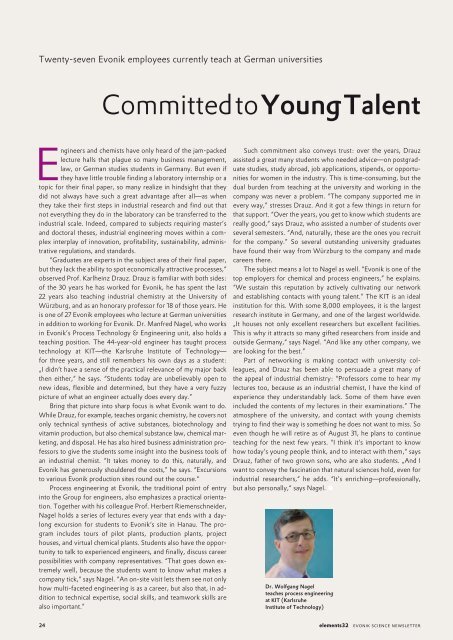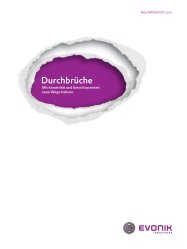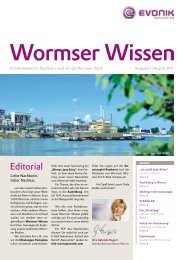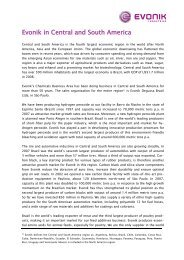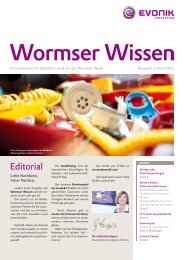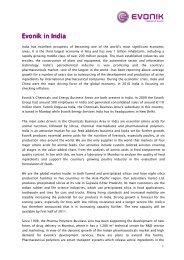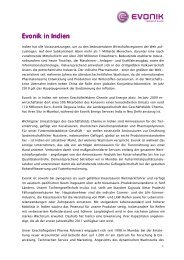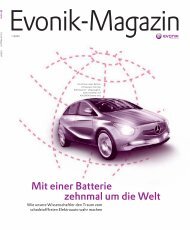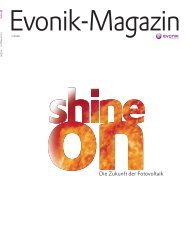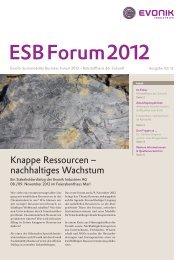Download - Evonik Industries
Download - Evonik Industries
Download - Evonik Industries
Create successful ePaper yourself
Turn your PDF publications into a flip-book with our unique Google optimized e-Paper software.
twentyseven evonik employees currently teach at German universities<br />
committed to young Talent<br />
Engineers and chemists have only heard of the jampacked<br />
lecture halls that plague so many business management,<br />
law, or German studies students in Germany. But even if<br />
they have little trouble finding a laboratory internship or a<br />
topic for their final paper, so many realize in hindsight that they<br />
did not always have such a great advantage after all—as when<br />
they take their first steps in industrial research and find out that<br />
not every thing they do in the laboratory can be transferred to the<br />
industrial scale. indeed, compared to subjects requiring master’s<br />
and doctoral theses, industrial engineering moves within a complex<br />
interplay of innovation, profitability, sustainability, administrative<br />
regulations, and standards.<br />
“Graduates are experts in the subject area of their final paper,<br />
but they lack the ability to spot economically attractive processes,“<br />
observed Prof. karlheinz Drauz. Drauz is familiar with both sides:<br />
of the 30 years he has worked for evonik, he has spent the last<br />
22 years also teaching industrial chemistry at the University of<br />
würzburg, and as an honorary professor for 18 of those years. He<br />
is one of 27 evonik employ ees who lecture at German universities<br />
in addition to work ing for evonik. Dr. Manfred nagel, who works<br />
in evonik’s Process technology & engineering unit, also holds a<br />
teaching position. the 44yearold engineer has taught process<br />
technology at kit—the karlsruhe institute of technology—<br />
for three years, and still remembers his own days as a student:<br />
„i didn‘t have a sense of the practical relevance of my major back<br />
then either,“ he says. “Students today are unbelievably open to<br />
new ideas, flexible and determined, but they have a very fuzzy<br />
picture of what an engineer actually does every day.”<br />
Bring that picture into sharp focus is what evonik want to do.<br />
while Drauz, for example, teaches organic chemistry, he covers not<br />
only technical synthesis of active substances, biotechnology and<br />
vitamin production, but also chemical substance law, chemical marketing,<br />
and disposal. He has also hired business administration professors<br />
to give the students some insight into the business tools of<br />
an industrial chemist. “it takes money to do this, naturally, and<br />
evonik has generously shouldered the costs,” he says. “excursions<br />
to various evonik production sites round out the course.“<br />
Process engineering at evonik, the traditional point of entry<br />
into the Group for engineers, also emphasizes a practical orientation.<br />
together with his colleague Prof. Herbert riemenschneider,<br />
nagel holds a series of lectures every year that ends with a daylong<br />
excursion for students to evonik‘s site in Hanau. the program<br />
includes tours of pilot plants, production plants, project<br />
hous es, and virtual chemical plants. Students also have the opportunity<br />
to talk to experienced engineers, and finally, discuss career<br />
possibilities with company representatives. “that goes down extremely<br />
well, because the students want to know what makes a<br />
company tick,“ says nagel. “An onsite visit lets them see not only<br />
how multifaceted engineering is as a career, but also that, in addition<br />
to technical expertise, social skills, and teamwork skills are<br />
also important.”<br />
Such commitment also conveys trust: over the years, Drauz<br />
assisted a great many students who needed advice—on postgraduate<br />
studies, study abroad, job applications, stipends, or opportunities<br />
for women in the industry. this is timeconsuming, but the<br />
dual burden from teaching at the university and working in the<br />
com pany was never a problem. “the company supported me in<br />
every way,” stresses Drauz. And it got a few things in return for<br />
that support. “over the years, you get to know which students are<br />
really good,“ says Drauz, who assisted a number of students over<br />
several semesters. “And, naturally, these are the ones you recruit<br />
for the com pany.” So several outstanding university graduates<br />
have found their way from würzburg to the company and made<br />
careers there.<br />
the subject means a lot to nagel as well. “evonik is one of the<br />
top employers for chemical and process engineers,” he explains.<br />
“we sustain this reputation by actively cultivating our network<br />
and establishing contacts with young talent.” the kit is an ideal<br />
institution for this. with some 8,000 employees, it is the largest<br />
research institute in Germany, and one of the largest worldwide.<br />
„it houses not only excellent researchers but excellent facilities.<br />
this is why it attracts so many gifted researchers from inside and<br />
outside Germany,“ says nagel. “And like any other company, we<br />
are look ing for the best.”<br />
Part of networking is making contact with university colleagues,<br />
and Drauz has been able to persuade a great many of<br />
the appeal of industrial chemistry: “Professors come to hear my<br />
lec tures too, because as an industrial chemist, i have the kind of<br />
experience they understandably lack. Some of them have even<br />
included the contents of my lectures in their examinations.” the<br />
atmosphere of the university, and contact with young chemists<br />
trying to find their way is something he does not want to miss. So<br />
even though he will retire as of August 31, he plans to continue<br />
teaching for the next few years. “i think it‘s important to know<br />
how today‘s young people think, and to interact with them,“ says<br />
Drauz, father of two grown sons, who are also students. „And i<br />
want to convey the fasci nation that natural sciences hold, even for<br />
industrial researchers,“ he adds. “it’s enriching—professionally,<br />
but also personally,“ says nagel. l<br />
Dr. Wolfgang Nagel<br />
teaches process engineering<br />
at KIT (Karlsruhe<br />
Institute of Technology)<br />
24 elements32 evonik science newsletter


